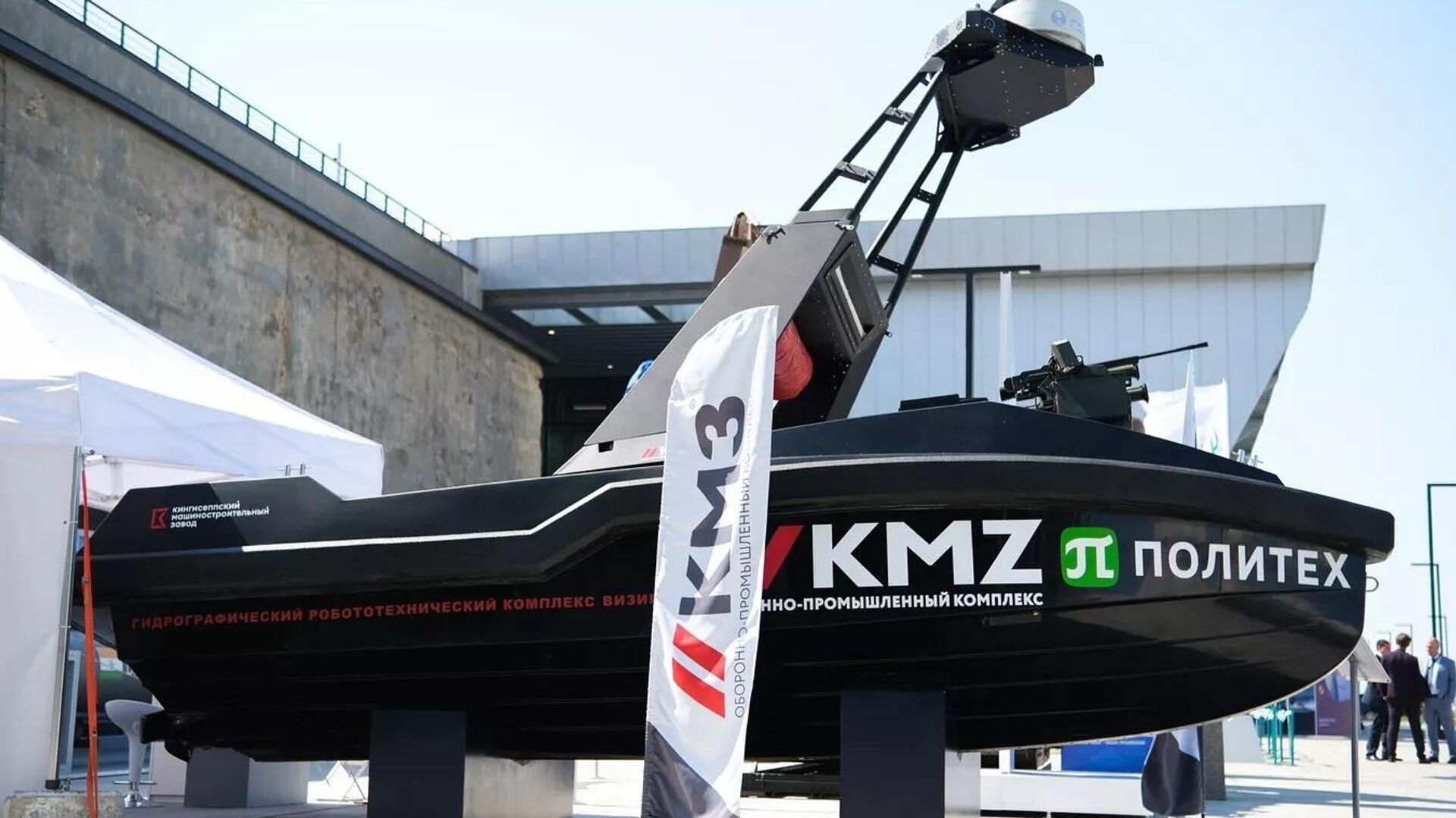https://sputnikglobe.com/20231127/new-russian-naval-drones-could-become-bane-of-ukraines-coasts-1115237336.html
New Russian Naval Drones Could Become Bane of Ukraine's Coasts
New Russian Naval Drones Could Become Bane of Ukraine's Coasts
Sputnik International
The first batch of new Russian naval drones to be tested in battlefield conditions is going to consist of ten units, each capable of reaching a speed of up to 80 kilometers per hour and carrying up to 600 kilograms worth of payload, explosive or otherwise
2023-11-27T16:18+0000
2023-11-27T16:18+0000
2023-11-28T05:25+0000
russia
black sea
drones
unmanned ships
analysis
https://cdn1.img.sputnikglobe.com/img/07e7/0b/1c/1115245518_0:71:1350:830_1920x0_80_0_0_5177e208cb29d087246c1214f229d2cb.jpg
New unmanned boat drones are expected to be delivered to the Russian military by the end of the year to be tested in the Ukrainian conflict zone, managing director of Kingisepp Machine-Building Plant (KMZ) Mikhail Danilenko told Sputnik.The first batch of these drones is going to consist of ten units, each capable of reaching a speed of up to 80 kilometers per hour and carrying up to 600 kilograms worth of payload, explosive or otherwise, he added.While such drones can pose a considerable threat to ships, they can also be used against coastal targets, Russian military historian Yury Knutov said.“Seeing how Ukraine currently has no navy, these drones are going to be used against coastal targets,” he speculated, noting, however, that any warship Ukraine tries to use under its flag will likely become a target for them.According to Knutov, a lone naval drone does not pose a threat to a large vessel such as an aircraft carrier or a cruiser (though a large number of drones might), not to mention that a drone needs to reach its intended target undetected in order to inflict serious damage.He pointed out that the drones’ payload may not necessarily be an explosive one, so instead of being used only as guided torpedoes, these unmanned boats can potentially be employed to move cargo or for intelligence gathering.Knutov also recalled that Russian unmanned boats were displayed during a naval parade this summer, and described the development announced by KMZ as a “new stage of development of such hardware.”“This hardware needs to be tested in battlefield conditions, and if it meets expectations, it will be adopted by the military,” he added.
https://sputnikglobe.com/20230816/multipurpose-naval-drone-created-in-russia-1112651594.html
russia
black sea
Sputnik International
feedback@sputniknews.com
+74956456601
MIA „Rossiya Segodnya“
2023
News
en_EN
Sputnik International
feedback@sputniknews.com
+74956456601
MIA „Rossiya Segodnya“
Sputnik International
feedback@sputniknews.com
+74956456601
MIA „Rossiya Segodnya“
russian unmanned boats, russian naval drones, russia drone warfare
russian unmanned boats, russian naval drones, russia drone warfare
New Russian Naval Drones Could Become Bane of Ukraine's Coasts
16:18 GMT 27.11.2023 (Updated: 05:25 GMT 28.11.2023) Russia's armed forces in the Black Sea may soon get their hands on a new weapon that can be used against both naval and coastal targets.
New
unmanned boat drones are expected to be delivered to the Russian military by the end of the year to be tested in the Ukrainian conflict zone, managing director of Kingisepp Machine-Building Plant (KMZ) Mikhail Danilenko told Sputnik.
The first batch of these drones is going to consist of ten units, each capable of reaching a speed of up to 80 kilometers per hour and carrying up to 600 kilograms worth of payload, explosive or otherwise, he added.
While such drones can pose a considerable threat to ships, they can also be used against coastal targets, Russian military historian Yury Knutov said.
“Seeing how Ukraine currently has no navy, these
drones are going to be used against coastal targets,” he speculated, noting, however, that any warship Ukraine tries to use under its flag will likely become a target for them.

16 August 2023, 20:07 GMT
According to Knutov, a lone naval drone does not pose a threat to a large vessel such as an aircraft carrier or a cruiser (though a large number of drones might), not to mention that a drone needs to reach its intended target undetected in order to inflict serious damage.
“Our [unmanned] boats have small above-water decks and they can carry up to 600 kilograms of payload, including explosives. Their range is about 200 kilometers and their top speed is 80 kilometers per hour. These characteristics are decent enough for the drones to be used against large enemy ships,” Knutov remarked. “600 kilograms of explosives would be enough to sink a corvette or in some cases even a frigate.”
He pointed out that the drones’ payload may not necessarily be an explosive one, so instead of being used only as guided torpedoes, these unmanned boats can potentially be employed to move cargo or for intelligence gathering.
Knutov also recalled that Russian unmanned boats were displayed during a naval parade this summer, and described the development announced by KMZ as a “new stage of development of such hardware.”
“This hardware needs to be tested in battlefield conditions, and if it meets expectations, it will be adopted by the military,” he added.



